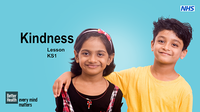Kindness – KS1 lesson plan
Developed with teachers and NHS-approved, this lesson explores why kindness is important. Pupils learn how to decide whether someone is being kind or unkind and identify things someone can do if others are being unkind.
A "Guidance for teachers" document contains details on how to link mental wellbeing lesson plans to school-wide approaches in place around social and emotional learning.
Curriculum
Supports the Relationships and Health Education curriculum
By the end of primary school, pupils should know:
- how to recognise and talk about their emotions, including having a varied vocabulary of words to use when talking about their own and others' feelings
- the importance of self-respect and how this links to their own happiness
- that in school and in wider society they can expect to be treated with respect by others, and that in turn they should show due respect to others
- the characteristics of friendships, including mutual respect, truthfulness, trustworthiness, loyalty, kindness, generosity, trust, sharing interests and experiences and support with problems and difficulties
Supports the PSHE curriculum
KS1 – Pupils learn:
- R11 – about how people may feel if they experience hurtful behaviour or bullying
- R21 – about what is kind and unkind behaviour, and how this can affect others
- R24 – how to listen to other people and play and work cooperatively
Learning outcomes
After this lesson, pupils will be able to:
- recognise why kindness is important
- identify some ways of being kind to ourselves and other people
- decide whether someone is being kind or unkind
- identify things someone can do if others are being unkind
Resource details
- Topics: Schools
- Target audience: Students and teachers
- Published: 22 August 2024
- Last updated: 8 August 2024
